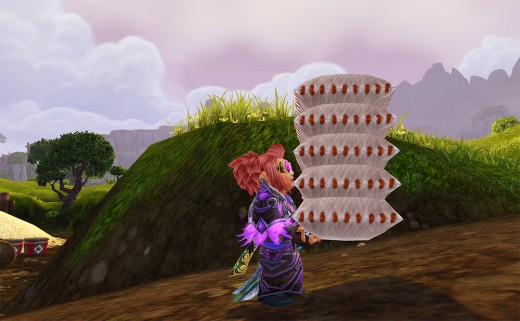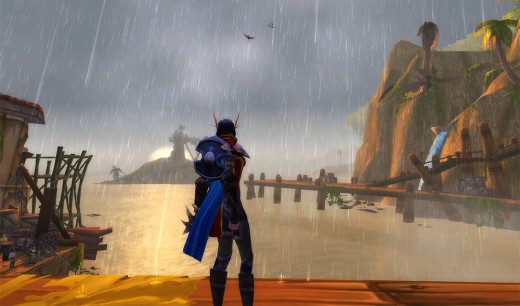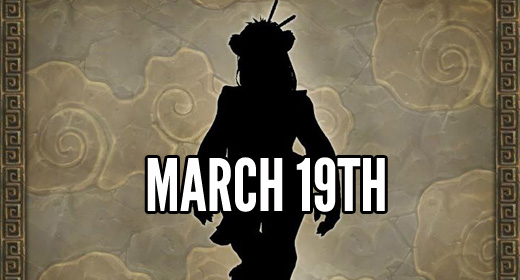
When I set out to make a point on my blog, it still surprises me at this “early” stage of getting my feet that people will not only take what I say seriously but run with it. Last week was a bit of a whirlwind for me - not just because I had a Serious Thing to Say, but that so many people agreed with me and passed the message on. There was also the usual round of criticism and I anticipated that. But the fact that it got discussed and debated and hotly argued over is really what impressed me. I like it when the things I think about open up a dialogue and make the gears start going with regards to our culture and how our language is symbolic of it. There were blog posts, comments and I even got linked as part of a larger post on WoW Insider. I do want to address some things though before I tackle that particular hornets nest.
First of all, I felt like some people focused exceptionally hard on the precise terms I used. Is “slut plate” a term that has landslide usage? That could be debated, I move around in different circles than other people and I could say that they might be more prone to using the term. However, is “slut plate” indicative of an very damaging, problematic concept that’s been going on for a while now? Oh, I do think so. (Warning: sexism/rape triggers) The screenshot linked as well as the header image are the search terms that lead to my blog - I know it was a joke tossed around that this is was a monster I birthed into being but I present to you some damning evidence that this is something that lurks in the hearts of many people who type things into Google. “Sassy plate” was my lighthearted attempt to at least use a term that didn’t feel so negative. I didn’t feel like people had to use it, but it felt a fair shade better than referring to something in such a harmful way.
The second and larger problem with talking about “slut plate” was that it focused on an entail without really giving my audience enough of a foundation in where my feelings were coming from on the armor in WoW in general, despite making several calls to it. World of Warcraft has a very problematic history with armor in that it’s consistently refused to give parallel coverage for both male and female characters in the game across all types of armor and that bothers me. It’s not a perfect system by any stretch of the imagination and I’d love to see that changed. However, giving people the option to transmog in or out of said armor is a slightly more preferable option from the outset. Wanting to destigmatize choosing skimpy armor when giving a free choice was my ultimate goal, but largely giving people a way of thinking about why the stigma was so harmful in the gaming world. It was pointed out to me that wearing said armor isn’t inherently a feminist choice in and of itself and yes, I do agree. We all make choices that lie within the larger cultural context, even in gaming culture. However, part of gaming culture is shaming people who make a choice that is “sexual” and that includes wearing armor that doesn’t cover. I want to abolish the sexist rhetoric that surrounds it, especially when it is women who make these choices and the language is incredibly gendered. I want to talk about it, I want to get a discussion going. I don’t want to stand idly by and accept that this is normal or acceptable. I felt like some people got angry about the mere hint that I might be trying to control their minds about how they view people who choose to dress like that in a video game, and honestly, I don’t care. If you really want to feel your feelings on other people’s sexual expression, even in a video game, that’s your right. However, the problem is when those thoughts and perceptions influence others when you say things.
That right there is the biggest issue I want to crack.
Words Are Words Are Words Are Words (Not)
Anne Stickney published a really interesting opinion piece on Wow Insider shortly after I posted up my piece on slut plate and it really made me think. However, I don’t know if it made me think in quite the way that Anne intended; I largely disagree with her opinion on where the power of words comes from. She makes some really good assertions but I think comes to an erroneous conclusion, despite grasping most of the problem. However, her bringing it up means we can have a larger discussion about it. This is why I’ve written this secondary piece - that and some of the frivolity that embroidered the Twitter replies and comments I saw on my blog and elsewhere about wanting to hang onto slut/skank as both descriptive terms and bon mots of all things. It is this idea that at the end of the day, words are words. They are malleable and flexible in terms of being divorced from their meaning and shouldn’t really affect you, as the reader or audience.
A-buh?
Let’s focus on the WoW Insider article instead - “What Makes a Bad Word Bad?”
Stickney talks about what words are - a collection of lines given meaning and used. Their meanings can change over time, even from negative to positive and vice-versa. Language is flexible and this is not an inherently new concept to discuss. However, she asks a lot of questions regarding this, in the true nature of criticism that I find appealing:
When did that happen, exactly? How did people take a word with one meaning and give it another — and more importantly, whydid we let it grow and fester into a word that we are now ultimately offended by?
If we have the power to change the meaning of a word from positive to negative, why do we seem to lack the power to stop it from changing at all?
It shows an awareness that language DOES have power. She then goes on to place that power squarely in the hands of those who are offended though.
It’s a power play, and there are far too many people out there who buy into it on a continual basis.
In short, it’s not the words that are harmful; they’re collections of lines. Placed in order, and given meaning. The person who gives those words meaning is the person who holds all the power over those words, not the person who is saying them. The person who is saying them is hoping beyond all hope that the ones who are listening are going to give those words the worst meaning possible and have some sort of negative reaction to it.
This makes me sad, ultimately, and while I feel I understand her personal motivations for the conclusions (I mean, who wouldn’t? It gives you a feeling of control) the fact that she’s espousing this across the board makes me upset. You cannot acknowledge that words have power but say it is all resting on the audience to grant that power to said words. No, the power of words is precisely why word choice is so thorny to begin with. Anne’s analysis skirts dangerously close to a couple of concepts that get tossed around in feminist discussion all the time: victim blaming (which we’ve touched on before) and the notion that things will stop hurting if we “get over” them hurting us. It’s a thick brocade of guilt, shame and blame that often traps most people are marginalized in some way.
Let’s pull it back to see why making a point like that is so boggling if it wasn’t evident from what I said already.
Language is a really fascinating thing - it isn’t just sounds, it isn’t just letters, it isn’t even just meaning or context or non-verbal/verbal gestures. It isn’t just tone. It is all of these things in a giant soup. They can be abstracted and pulled apart, mushed back together and analyzed a billion different ways. At its basest form, it is an attempt to put thoughts and feelings into a way that communicates them to an audience. We even think in “words” a lot of the time, which is a conversation to ourselves. Communication is the interaction that occurs between the sender and receiver, the speaker and the audience. The message and the medium, as Marshall McLuhan used to speak fondly about. Communication theorists, language scholars, and philosophers have all tackled the questions of the very nature of language and what it means, how it works. To me, the cornerstone of the process is words. Any way you want to look at language, you have to acknowledge that the gateway to all facets of its study is within words. A collection of lines or sounds, given meaning. They are the little sailboats we float across the river and hope drift safely to the far shore.
Where words get their meaning is a collection of simultaneous decisions on the part of us as a society, as groups, and as human beings. Words and their meaning can shift between precise and imprecise, with wildly different usages, histories or nuance given any number of things. As a communication graduate, a lot of what we looked at was how communication breaks down between sender and receiver and oftentimes that had to do with an imprecise or incongruous understanding of the meaning of what was said. The misfire between intent and reaction is fascinating. I could stand here most of the day and talk about why this occurs, but I’d like to interject two very big elephants in the room when it comes to the collision between language and social sciences.
I’d like everyone to say hi to Power and Emotion.
Power and emotion are two very complex, very different kinds of subjects that give some words and meanings more influence over others. It is what makes them more effective, more persuasive, more coercive, more harmful or beneficial. This is why Anne’s argument falls apart in my eyes. She feels that the power comes from the audience, but that’s looking at it from an emotional standpoint and it is a very lopsided way of understanding the dynamics between Power and Emotion. Words are given power by our collective society, and in turn, they have the power to make an audience feel things. In that way, she is correct, we do feel things from the words said to us. Anyone who has been taken by an enthusiastic speech or cut down by a sharp turn of phrase in a fight knows that words do hurt. We have the ability to be moved by the language of others. This is a natural reaction of sentience. However (and this is a fundamental part of philosophy and social issues), words and meanings have power that flows in from our larger network of societal advantages. A speaker can do a lot of things knowing what kind of power a word has, that’s the whole reason they are said. Our language has the power to inform, to shape our reality. This comes to a head when that power is given to the feelings of hate and discrimination we feel inside. Historically, there have been many groups we have cut down and kept down even with our words. Our words enforce and permit a cage that people can be trapped in, long after we’ve stopped physically harming them as a society (or even if we haven’t.) This is where the complex emotional latticework I mentioned before comes back into play. Even if the speaker has the privilege of not caring or not being aware of the power a word can have on someone, it still can wreck grievous harm on the audience. This is because words are never quite divorced from lived experienced, history, or context.
Pull this back out of abstraction and you have scenarios like this:
A woman is walking home from work in a big city. A car of young men drives by and shouts “SLUT!” at her. It feels scary.
Same woman is reading the internet and comes across people in a video game discussing “slutty outfits.”
This might be a bit of an extreme example (thought it has happened to me) but it shows that one word used two different places can speak to a larger emotional experience as the audience and it comes from people having the power to denigrate the woman with their words. To say the people speaking said words are inscrutable and not culpable for wielding the power of destructive words and meanings is short-sighted and harmful. It gives people more social currency to continue not caring about how they affect others or gleefully allows them the permission to keep doing it for their own benefit. To chastise the audience (intended or not) for their feelings and to ignore the power we give words not only is double-faced (acknowledge that a word had power over you, now pretend it doesn’t have any power at all) but callous. While I believe is empowering if someone can move into a space of not being hurt by a long-standing slur or trigger, to believe that all people should move past it in the face of real historical or social inequalities (enforced and illuminated by words) is terrible. It says, “You should ignore people hurting you” when we should be focus on the people doing the hurting. We’re not stupid. We know what hurts people and when we don’t, and are informed that they do and why, why do we tell victims to shoulder it and move on? Why not acknowledge the feelings of others and become better people?
Does it suck to feel like shit all the time? Totally. I get, like I said before, the desire for control in a world that seeks to shit on your face regularly. Control and your own power where you’ve largely had none. But I’m never going to feel comfortable turning around and telling people that it is their own fault that a word makes them upset when we’ve built social mechanisms behind making those words hurt as hard and long as possible, with very little consequences for people who use them thoughtlessly, aggressively, repeatedly. This is why gamer culture is feeling such growing pains lately - what has been a long-standing tradition of mocking those who feel hurt by legitimately hurtful things, to use words to denigrate and inflame others is now being criticized and studied, turned on its head. I do not accept Anne’s argument that we as people victimized by language are the sole arbiters of the power these words have when they have very large social contexts. When we let people in power speak the hate they feel in their minds and hearts, these words are a crushing blow to those they feel like discriminating. When you add in a culture that gives them a high five for doing so, that gives them justifications for dehumanizing people, it lets them compartmentalize their brains. It gives us things like “Well I didn’t mean it THAT way” because they do not value the feelings of their audiences.
It is a long standing edict in social justice discourse that “intent isnt magical.” What this means is that your intended meaning doesn’t matter if you hurt someone, what matters is that the hurt occurred. Gamers are some of the most egregious offenders of pretending that they can divorce their words and messages from their long-standing cultural meanings and viciousness to mean something “tame” and inoffensive. It is a false ability they believe they’ve been given when they’ve long been the group most likely to benefit from not being on the sharp pointy end of hurtful words.
We should not have to get over someone hurting us. What we should get over, as a culture, is using words to reduce others in a myriad of ways that speak to larger societal issues. We should stop letting our gaming spaces be trickle down streams of the gaping inequalities we still enforce in our culture. We should stop suckerpunching others with gross terms and smug positions of power and then telling our recipients to just stop feeling the blows. It is an argument that is the logical equivalent of “stop hitting yourself.” While I feel Anne’s heart was in the right place in that she doesn’t wish people to feel upset about the stupid shit people say, the fact that we should ignore the larger problems of said stupid shit is wrong.
Words are words, but they are very powerful things indeed.











